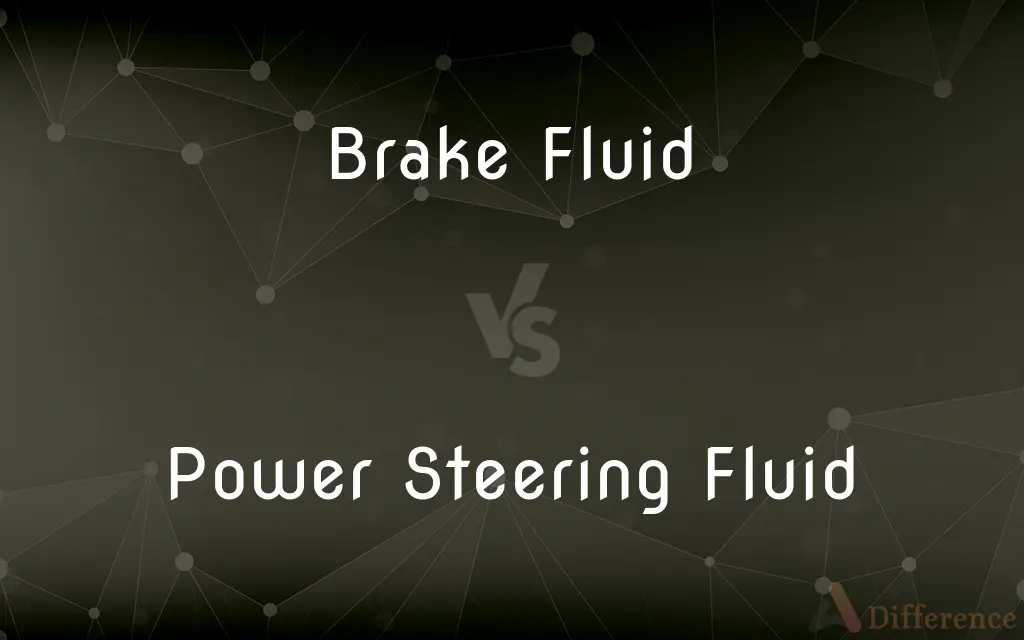Brake Fluid vs. Power Steering Fluid — What's the Difference?
By Tayyaba Rehman — Published on January 8, 2024
Brake fluid is a hydraulic fluid for brake systems, ensuring braking efficiency, while power steering fluid lubricates and aids the power steering system's function.

Difference Between Brake Fluid and Power Steering Fluid
Table of Contents
ADVERTISEMENT
Key Differences
Brake fluid is a type of hydraulic fluid specifically designed for use in vehicle brake systems. It transfers force into pressure to enhance the braking system's efficiency. Power steering fluid, on the other hand, is used in the power steering system of a vehicle to assist in steering the wheels easily, by transmitting the power from the steering wheel to the steering mechanism.
In terms of composition, brake fluid is typically glycol-ether-based or silicone-based and must meet specific boiling point criteria to maintain performance under high temperatures generated during braking. Power steering fluid is generally petroleum or silicone-based, and its primary function is to lubricate and protect the power steering pump and other components.
Brake fluid is characterized by its high boiling point and low compressibility to ensure consistent brake pedal feel and responsiveness. It absorbs moisture over time, which can lower its boiling point and effectiveness, necessitating regular replacement. Power steering fluid, while also subject to degradation, primarily requires stability and resistance to pressure and heat to protect and operate the steering system efficiently.
Regarding maintenance, brake fluid levels and quality should be checked regularly as part of vehicle maintenance, with full replacement typically recommended every two years. Power steering fluid maintenance involves monitoring for leaks and maintaining proper fluid levels, with full fluid changes less frequent but necessary over time.
Safety and performance are critical for both fluids, but brake fluid is essential for safe braking, and its failure can result in brake system failure. Power steering fluid contributes to the ease and control of steering, and its failure can lead to steering difficulties but typically doesn't result in immediate danger like brake fluid failure.
ADVERTISEMENT
Comparison Chart
Primary Function
Transfers force in brake systems
Lubricates power steering system
Composition
Glycol-ether or silicone-based
Petroleum or silicone-based
Boiling Point
High boiling point required
Stability under pressure and heat
Maintenance Frequency
Regular checks, biennial replacement
Regular checks, less frequent change
Safety Impact
Critical for braking
Affects steering ease and control
Compare with Definitions
Brake Fluid
Regular Replacement Needed: Requires biennial replacement.
Mechanics often recommend changing brake fluid every two years.
Power Steering Fluid
Lubricating Fluid: Lubricates the power steering system.
Using the right power steering fluid ensures smooth steering.
Brake Fluid
Moisture Absorption: Absorbs moisture over time.
Over time, brake fluid can degrade due to moisture absorption.
Power Steering Fluid
Eases Steering Control: Aids in easy steering.
Power steering fluid makes turning the steering wheel effortless.
Brake Fluid
Hydraulic Fluid: Used in vehicle braking systems.
Regularly checking brake fluid levels is vital for safe driving.
Power Steering Fluid
Component Protection: Protects steering components.
Regularly checking power steering fluid levels can prevent wear on the pump.
Brake Fluid
High Boiling Point: Maintains performance at high temperatures.
Brake fluid's high boiling point prevents vapor lock during intense braking.
Power Steering Fluid
Pressure and Heat Stability: Resists pressure and heat.
Power steering fluid maintains its properties under various driving conditions.
Brake Fluid
Force Transmission: Transfers force into pressure.
Brake fluid is essential for the proper functioning of hydraulic brakes.
Power Steering Fluid
Less Frequent Changes: Requires changes less often than brake fluid.
Power steering fluid change intervals are typically longer than brake fluid.
Common Curiosities
Can brake fluid be used as power steering fluid?
No, they have different properties and uses and should not be interchanged.
How often should power steering fluid be changed?
It varies by vehicle, but generally every 50,000 to 100,000 miles.
Can I top off my brake fluid myself?
Yes, but ensure you use the correct type of fluid and do not overfill.
Is power steering fluid universal?
No, different vehicles may require specific types of power steering fluid.
How can I check power steering fluid levels?
Use the dipstick in the power steering fluid reservoir, typically marked with minimum and maximum indicators.
Why does brake fluid need a high boiling point?
To prevent vaporization and maintain braking efficiency under high temperatures.
Can I drive with a power steering fluid leak?
It's not recommended as it can lead to steering difficulties.
What are the signs of low brake fluid?
Indicators include a spongy brake pedal, decreased brake responsiveness, and a brake warning light.
Can power steering fluid leak be dangerous?
Yes, it can lead to steering difficulty and potential steering failure.
What happens if brake fluid is not changed?
Old brake fluid can lead to brake system corrosion and reduced braking efficiency.
What causes brake fluid to degrade?
Moisture absorption and high temperatures lead to degradation.
Does the type of power steering fluid matter?
Yes, using the incorrect type can damage the system.
How do I dispose of old brake fluid?
It should be taken to a hazardous waste disposal facility due to its toxic nature.
Is it normal for power steering fluid levels to drop?
A slight decrease over time is normal, but significant drops may indicate a leak.
What's the difference in cost for brake fluid vs. power steering fluid?
Costs vary, but generally, both fluids are reasonably priced.
Share Your Discovery

Previous Comparison
MKV vs. MP4
Next Comparison
Destructive Distillation vs. Fractional DistillationAuthor Spotlight
Written by
Tayyaba RehmanTayyaba Rehman is a distinguished writer, currently serving as a primary contributor to askdifference.com. As a researcher in semantics and etymology, Tayyaba's passion for the complexity of languages and their distinctions has found a perfect home on the platform. Tayyaba delves into the intricacies of language, distinguishing between commonly confused words and phrases, thereby providing clarity for readers worldwide.














































